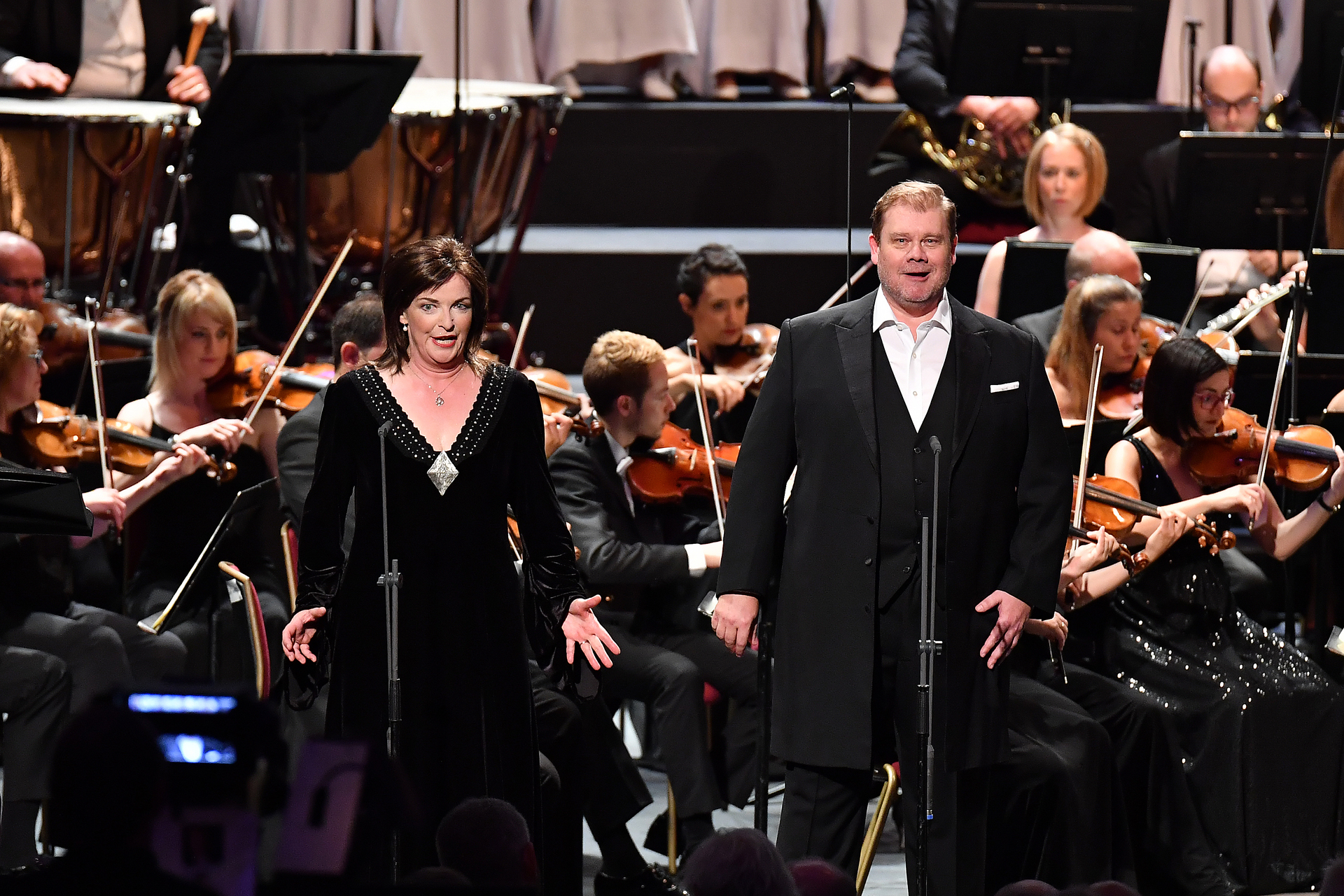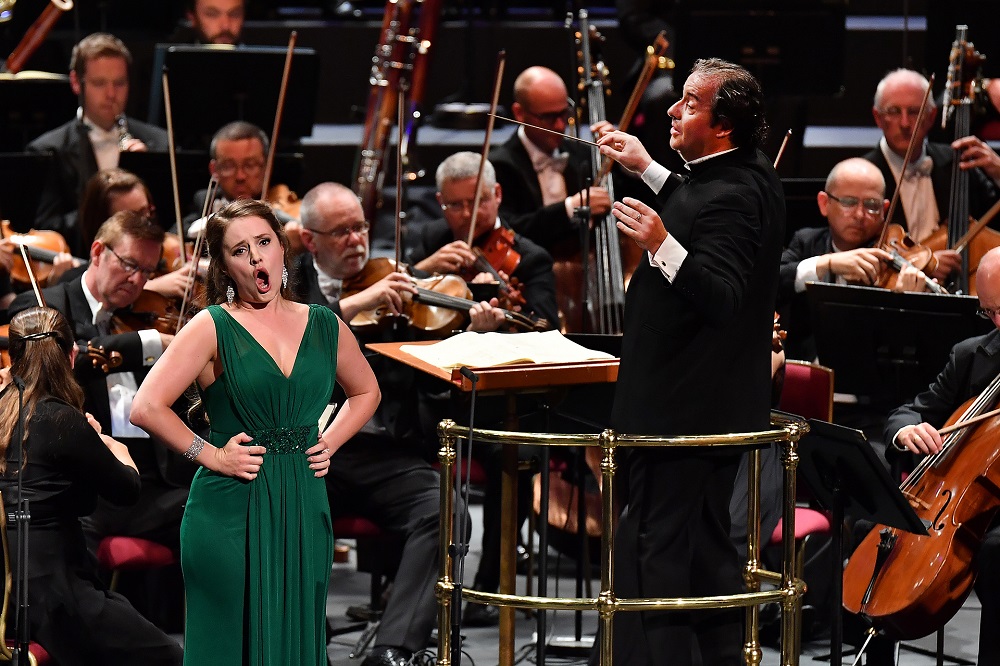Prom 9 review: Fidelio, BBCPO, Mena - classy prison drama rarely blazes | reviews, news & interviews
Prom 9 review: Fidelio, BBCPO, Mena - classy prison drama rarely blazes
Prom 9 review: Fidelio, BBCPO, Mena - classy prison drama rarely blazes
Lively conducting and difficult roles well taken, but the supporting cast shines brightest
What a pity Beethoven never composed an appendage to Fidelio called The Sorrows of Young Marzelline. One crucial moment apart, the music he gives to his second soprano in his only opera isn't his best, but Louise Alder so lived the role of the gaoler's daughter in love with a woman disguised as a man that everything else felt rather less intense. It's only fair to say that there were other singers facing bigger challenges very stylishly, for the most part, but neither they nor the BBC Philharmonic under its chief conductor Juanjo Menja made us feel as though their lives depended on the outcome. And that ultimate lack of blazing commitment, in what should be the most incandescent of prison dramas, sold it all a bit short.
True, this was an unashamed concert-performance Prom with no directorial supervision, principals delivering score-free – with one exception, James Creswell, a more than adequate late replacement for Brindley Sherratt as gaoler Rocco – in front of the orchestra, with co-ordination not always the tightest. This, Beethoven's much more celebrated revision of the original Leonore swapping drama for a pageant-finale, worked best in that oratorio-like final scene – though like much else it was bright and pleasant rather than shattering or deeply moving. It was hard to come from the Chamber Orchestra of Europe under Haitink, projecting every phrase of Mozart and Schumann into the Albert Hall space, and be brought back down to earth with the more usual situation of fuzzy strings lacking ideal bite. No doubt the answer would be to stand in the Arena, an occasional option, but no way was this playing on the same level. And the horns were having a bad night.

Villainous prison governor Pizarro can only work at a level of testosterone-driven edginess; Detlef Roth conveyed nothing more than a petulant bank-manager, despite a couple of energetic footstamps. Creswell's subordinate could have eaten him for breakfast; as they sang alongside each other, one got the feeling of the same mésalliance as when King Philip in Verdi's Don Carlos has more vocal power than the only one supposedly lording it over him, the Grand Inquisitor. We could have done with more colours and force from the Orfeón Donostiarra, Spain's finest choral society, playing their compatriots albeit singing in German, but emphatically not the essential professional opera chorus. Better, perhaps, to have assembled voices from the London music colleges.

Amplifying the (minimal) spoken dialogue meant a plunge in levels for the music. Cultivated, mostly lively orchestral playing just needed more heft, despite excellent work from timpanist Paul Turner. It didn't tell the story by itself, and given that the Proms organisers still won't provide supertitle screens around the hall – it can be done – more of the performers needed to work harder to carry the narrative and compel focus from those in the audience with their heads in the programme.
- Listen to this Prom for the next month on the BBC iPlayer
- Stop press: Louise Alder replaces an indisposed Andrei Bondarenko for a Wigmore Hall recital with Gary Matthewman tonight (22 July)
- Read more opera reviews on theartsdesk
Next page: watch Louise Alder sing 'No word from Tom' from Stravinsky's The Rake's Progress at the BBC Cardiff Singer of the World Competition
What a pity Beethoven never composed an appendage to Fidelio called The Sorrows of Young Marzelline. One crucial moment apart, the music he gives to his second soprano in his only opera isn't his best, but Louise Alder so lived the role of the gaoler's daughter in love with a woman disguised as a man that everything else felt rather less intense. It's only fair to say that there were other singers facing bigger challenges very stylishly, for the most part, but neither they nor the BBC Philharmonic under its chief conductor Juanjo Menja made us feel as though their lives depended on the outcome. And that ultimate lack of blazing commitment, in what should be the most incandescent of prison dramas, sold it all a bit short.
True, this was an unashamed concert-performance Prom with no directorial supervision, principals delivering score-free – with one exception, James Creswell, a more than adequate late replacement for Brindley Sherratt as gaoler Rocco – in front of the orchestra, with co-ordination not always the tightest. This, Beethoven's much more celebrated revision of the original Leonore swapping drama for a pageant-finale, worked best in that oratorio-like final scene – though like much else it was bright and pleasant rather than shattering or deeply moving. It was hard to come from the Chamber Orchestra of Europe under Haitink, projecting every phrase of Mozart and Schumann into the Albert Hall space, and be brought back down to earth with the more usual situation of fuzzy strings lacking ideal bite. No doubt the answer would be to stand in the Arena, an occasional option, but no way was this playing on the same level. And the horns were having a bad night.

Villainous prison governor Pizarro can only work at a level of testosterone-driven edginess; Detlef Roth conveyed nothing more than a petulant bank-manager, despite a couple of energetic footstamps. Creswell's subordinate could have eaten him for breakfast; as they sang alongside each other, one got the feeling of the same mésalliance as when King Philip in Verdi's Don Carlos has more vocal power than the only one supposedly lording it over him, the Grand Inquisitor. We could have done with more colours and force from the Orfeón Donostiarra, Spain's finest choral society, playing their compatriots albeit singing in German, but emphatically not the essential professional opera chorus. Better, perhaps, to have assembled voices from the London music colleges.

Amplifying the (minimal) spoken dialogue meant a plunge in levels for the music. Cultivated, mostly lively orchestral playing just needed more heft, despite excellent work from timpanist Paul Turner. It didn't tell the story by itself, and given that the Proms organisers still won't provide supertitle screens around the hall – it can be done – more of the performers needed to work harder to carry the narrative and compel focus from those in the audience with their heads in the programme.
- Listen to this Prom for the next month on the BBC iPlayer
- Stop press: Louise Alder replaces an indisposed Andrei Bondarenko for a Wigmore Hall recital with Gary Matthewman tonight (22 July)
- Read more opera reviews on theartsdesk
Next page: watch Louise Alder sing 'No word from Tom' from Stravinsky's The Rake's Progress at the BBC Cardiff Singer of the World Competition
rating
Explore topics
Share this article
Add comment
more Opera
 Simon Boccanegra, Hallé, Elder, Bridgewater Hall, Manchester review - thrilling, magnificent exploration
Verdi’s original version of the opera brought to exciting life
Simon Boccanegra, Hallé, Elder, Bridgewater Hall, Manchester review - thrilling, magnificent exploration
Verdi’s original version of the opera brought to exciting life
 Aci by the River, London Handel Festival, Trinity Buoy Wharf Lighthouse review - myths for the #MeToo age
Star singers shine in a Handel rarity
Aci by the River, London Handel Festival, Trinity Buoy Wharf Lighthouse review - myths for the #MeToo age
Star singers shine in a Handel rarity
 Carmen, Royal Opera review - strong women, no sexual chemistry and little stage focus
Damiano Michieletto's new production of Bizet’s masterpiece is surprisingly invertebrate
Carmen, Royal Opera review - strong women, no sexual chemistry and little stage focus
Damiano Michieletto's new production of Bizet’s masterpiece is surprisingly invertebrate
 La scala di seta, RNCM review - going heavy on the absinthe?
Rossini’s one-acter helps young performers find their talents to amuse
La scala di seta, RNCM review - going heavy on the absinthe?
Rossini’s one-acter helps young performers find their talents to amuse
 Death In Venice, Welsh National Opera review - breathtaking Britten
Sublime Olivia Fuchs production of a great operatic swansong
Death In Venice, Welsh National Opera review - breathtaking Britten
Sublime Olivia Fuchs production of a great operatic swansong
 Salome, Irish National Opera review - imaginatively charted journey to the abyss
Sinéad Campbell Wallace's corrupted princess stuns in Bruno Ravella's production
Salome, Irish National Opera review - imaginatively charted journey to the abyss
Sinéad Campbell Wallace's corrupted princess stuns in Bruno Ravella's production
 Jenůfa, English National Opera review - searing new cast in precise revival
Jennifer Davis and Susan Bullock pull out all the stops in Janáček's moving masterpiece
Jenůfa, English National Opera review - searing new cast in precise revival
Jennifer Davis and Susan Bullock pull out all the stops in Janáček's moving masterpiece
 theartsdesk in Strasbourg: crossing the frontiers
'Lohengrin' marks a remarkable singer's arrival on Planet Wagner
theartsdesk in Strasbourg: crossing the frontiers
'Lohengrin' marks a remarkable singer's arrival on Planet Wagner
 Giant, Linbury Theatre review - a vision fully realised
Sarah Angliss serves a haunting meditation on the strange meeting of giant and surgeon
Giant, Linbury Theatre review - a vision fully realised
Sarah Angliss serves a haunting meditation on the strange meeting of giant and surgeon
 Der fliegende Holländer, Royal Opera review - compellingly lucid with an austere visual beauty
Bryn Terfel's Dutchman is a subtly vampiric figure in this otherworldly interpretation
Der fliegende Holländer, Royal Opera review - compellingly lucid with an austere visual beauty
Bryn Terfel's Dutchman is a subtly vampiric figure in this otherworldly interpretation
 The Magic Flute, English National Opera review - return of an enchanted evening
Simon McBurney's dark pantomime casts its spell again
The Magic Flute, English National Opera review - return of an enchanted evening
Simon McBurney's dark pantomime casts its spell again
 Così fan tutte, Welsh National Opera review - relevance reduced to irrelevance
School for lovers not much help to the singers
Così fan tutte, Welsh National Opera review - relevance reduced to irrelevance
School for lovers not much help to the singers

Comments
Why not surtitles? Even the
Odd, isn't it - the one
Odd, isn't it - the one sphere in which the Proms is not tech-savvy. The response I've had in the past is that the hall is too big and too few people would see a central screen. To which the answer is obvious - have a number of screens, up to half a dozen, to ensure everyone can see them. I wonder if Gubbay spectaculars use them (if indeed the operas are performed in their original languages). Someone told me they thought they did. Of course TV viewers will get them on their screens.